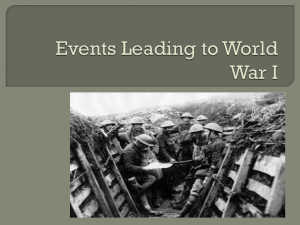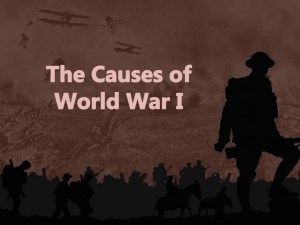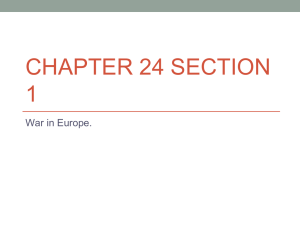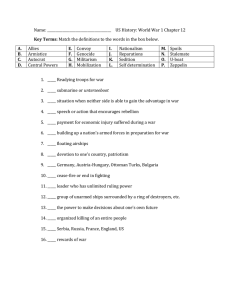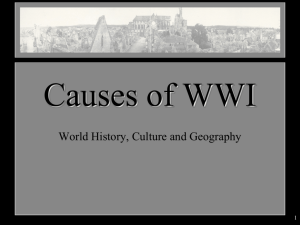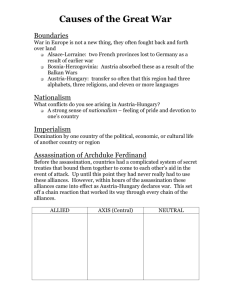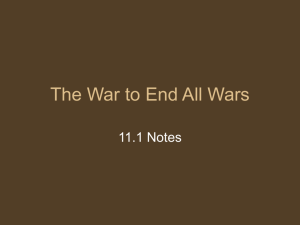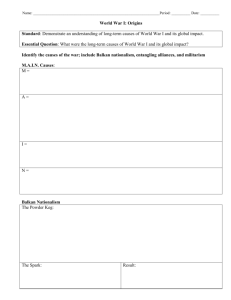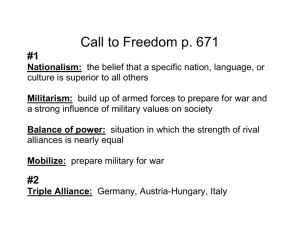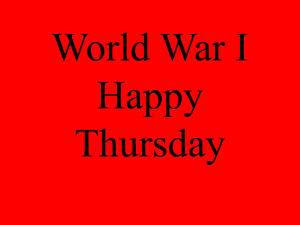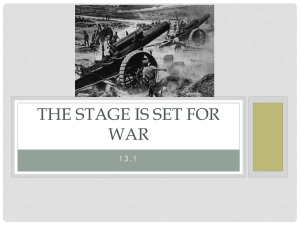Austria-Hungary declares war on Serbia
advertisement
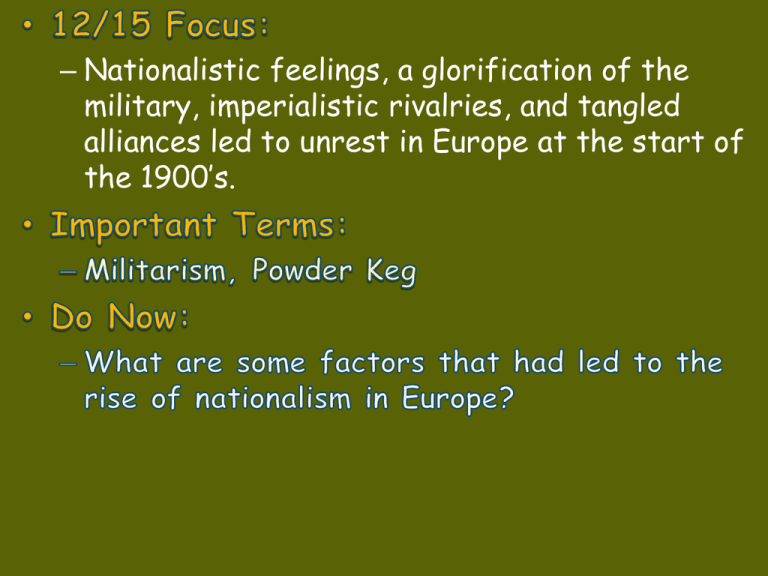
– Nationalistic feelings, a glorification of the military, imperialistic rivalries, and tangled alliances led to unrest in Europe at the start of the 1900’s. World War I Outbreak of War in Europe Causes of WWI Key Terms • Militarism The policy of building up military forces or threatening armed aggression • Alliances An agreement between nations to come to the defense of each other if attacked by another nation. • Imperialism • Nationalism The attempt by a nation to control the political, economic, and cultural affairs of another nation Pride in and devotion to one’s country Germany • Leaders – Kaiser Wilheim (King) – Otto von Bismark (chancellor) Germany • Nationalism had fueled German Unification – Blood and Iron policy – 1871: the German nation was formed from a group of independent nation-states with a common heritage • Bismarck transformed the nation into a industrial and military power Germany • Foreign Policy – Establish alliances to prevent Russia and France becoming allies – Increase military strength – Increase German influence in world affairs France • Wanted to regain role as a power in Europe • History of conflict with the German states – Competition for territory in Africa – Territorial disputes over the border – Franco-Prussian War • Suffered humiliating defeat to the Germans • Lost territory on its border (Alsace Lorraine) • Began to build up its military to get revenge La Revenge Great Britain • Had a large empire – “Sun never sets on the British Empire” • powerful army/navy • Saw German industrialization and militarization as a potential threat – Led Britain to form close ties with France Russia • controlled by a autocratic czar (king) – Czar Nicholas Romanov II – Repressed the people – Opposed reforms • Led to a growing opposition to the rule of the Czar • Promoted Pan-Slavism – Nationalist movement to unite Slavic people in E. Europe – Came to the defense of Slavic people in the Balkans • Serbia Ottoman Empire • A once powerful empire that was losing its power • History of conflicts with Russia • Had good relations with Germany Austria-Hungary • Leader: – Franz Joseph – The Dual Monarchy • Austrian monarch and Hungarian monarchs shared power Austria-Hungary • Controlled many different ethnic groups • Nationalism fueled ethnic minorities desire for independence from Austria – Balkans (Serbs and Croats) – Czechs – Poland “The Powder Keg of Europe” System of Alliances The Triple Alliance The Triple Entente Germany Austria Hungary Russia Great Britain Italy France Ottoman Empire will become allies later forming the Central Powers The Balkan Powder Keg • Serbian nationalists wanted to unite Serbs in the Balkans – Create a Slavic state – Austria-Hungary opposed this effort • Austria- Hungary annexed BosniaHerzegovina – Large number of Serbs – Angered Serbian nationalists The Spark Militarism Alliances Imperialism Nationalism June, 28, 1914: Serbian nationalist, Gavrilo Princip, Assassinates Archduke Franz Ferdinand of Austria Hungary in Sarajevo Archduke Franz Ferdinand & His Family The Assassination: Sarajevo The Assassin: Gavrilo Princip THE ALLIANCE SYSTEMS GO INTO ACTION ? Great Britain declares war on Germany Germany declares war on Russia Germany declares war on France ? AustriaHungary declares war on Serbia Russia mobilizes army to the border with A-H Outbreak of War Austria-Hungary blames Serbia for death of Archduke and makes harsh demands Serbia refused to comply with demands Austria-Hungary declares war on Serbia (July 28 1914) Russia moves troops to border with Austria and Germany Germany declares war on Russia Germany declares war on France Germany invades Belgium as part of plan to invade France (August 3, 1914) Great Britain declares war on Germany Points for Discussion • What are the four primary causes of WWI • What is the immediate cause of WWI
